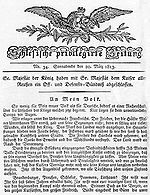
An Mein Volk
Encyclopedia

Frederick William III of Prussia
Frederick William III was king of Prussia from 1797 to 1840. He was in personal union the sovereign prince of the Principality of Neuchâtel .-Early life:...
on 17 March 1813 in Breslau (Wrocław). Addressed to his subjects, Preußen und Deutsche ("Prussians and Germans" — the former term embracing several nationalities), it appealed for their support in the struggle against Napoleon. Hostilities had been declared the day before.
The document is the first instance of a Prussian monarch directly addressing the public in order to justify his policies. It was drafted by the Prussian councillor Theodor Gottlieb von Hippel the Younger
Theodor Gottlieb von Hippel the Younger
Theodor Gottlieb Hippel, from 1790 von Hippel was a Prussian statesman, the friend of E. T. A. Hoffmann, and the author of Frederick William III's proclamation An Mein Volk...
, and published in the Schlesische privilegirte Zeitung
Schlesische Zeitung
The Schlesische Zeitung was one of the most reputable newspapers in Prussia and the German Reich. It was founded in 1742 and ceased publication in 1945....
on 20 March 1813.
The proclamation, which affirmed the unity of crown, state and nation, led to the massive expansion of the Prussian army, and to the creation of militia
Militia
The term militia is commonly used today to refer to a military force composed of ordinary citizens to provide defense, emergency law enforcement, or paramilitary service, in times of emergency without being paid a regular salary or committed to a fixed term of service. It is a polyseme with...
s, paramilitary organizations, and Freikorps
Freikorps
Freikorps are German volunteer military or paramilitary units. The term was originally applied to voluntary armies formed in German lands from the middle of the 18th century onwards. Between World War I and World War II the term was also used for the paramilitary organizations that arose during...
(such as that led by Major Adolf von Lützow
Ludwig Adolf Wilhelm von Lützow
Ludwig Adolf Wilhelm Freiherr von Lützow was a Prussian lieutenant general notable for his organization and command of a Lützow Freikorps of volunteers during the Napoleonic Wars...
).
External links
- Text at www.documentarchiv.de
- Translation at GHDI

